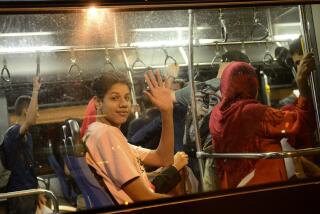Rival Shiite leaders agree to truce in Iraq
- Share via
baghdad -- Radical Shiite cleric Muqtada Sadr and his chief rival, Abdelaziz Hakim, reached a truce Saturday to end bloodshed between their loyalists that has killed scores of Iraqis and raised fears of a new front in the Iraq war.
Officials of Hakim’s Supreme Islamic Iraqi Council said the deal was hammered out during a 4 1/2 -hour meeting between the Shiite Muslim leaders, whose militias have been vying for control of oil-rich southern Iraq. Both sides said they would reveal details today.
Britain is decreasing its troop strength in the overwhelmingly Shiite south, and there are concerns that in the absence of foreign forces, all-out war will erupt between Sadr’s Mahdi Army and the Badr Organization militia of Hakim’s party. More than 50 Iraqis, most of them Shiite pilgrims, died in August in militia clashes in the southern city of Karbala.
British Prime Minister Gordon Brown last week announced plans to pull 1,000 of the 5,500 British troops still in Iraq out of their base in Basra by Christmas. The southern province is the last under British control. Brown, facing pressure at home to end his country’s involvement in the war, is expected to announce further withdrawals soon and a transfer of Basra to Iraqi leaders.
An announcement on the truce, broadcast on the satellite television channel controlled by the Supreme Islamic Iraqi Council, said it would include the forming of committees in each province to try to work out problems before they explode in violence.
Vali Nasr, an expert on Shiite politics at the Council on Foreign Relations, said the pact was significant. “The two have the largest militias, and the most extensive political networks and bases of support. The deal, if it sticks, can bring stability to southern Iraq,” he said.
“These are the most influential of the parties, so we hope this will have a positive reflection on the ground,” said Dhiauddin Fayadh, a Shiite lawmaker and a member of the Supreme Islamic Iraqi Council.
A spokesman for Sadr said the deal was aimed at calming tensions on the streets, but it would have no effect on the cleric’s decision to leave the Shiite political alliance of Prime Minister Nouri Maliki in parliament. Sadr pulled his 30 lawmakers from the bloc last month, leaving it with only 83 seats in the 275-member parliament.
Sadr has been a fierce opponent of the U.S. presence in Iraq and has criticized Maliki for not demanding the withdrawal of American forces.
Analysts have said Sadr’s moves since February, when President Bush began sending additional forces to Iraq as part of a plan to encourage political progress in Baghdad, indicate that he is positioning himself to take on a more powerful political role when those troops begin leaving.
Sadr, whose militia had fought the Americans, decided not to challenge the U.S. forces militarily. He gained more political credibility after the Karbala violence when he called on his militia to freeze armed actions, ostensibly so he could root out “rogue elements.”
Joost Hiltermann, an Iraq expert with the International Crisis Group, said the new truce with Hakim served both sides well since neither was capable of winning a decisive military victory, and it could be part of Sadr’s long-term political strategy.
Hakim, ill with cancer, enjoys good relations with the United States. He is unlikely to move against Sadr for the time being. To do so while Sadr has frozen his militia activities would make him look overly aggressive. Sadr, meanwhile, remains on the defensive as long as U.S. forces are in Iraq, but he is biding his time, Hiltermann said.
The more time he has to cast himself as a peacemaker rather than a rabble-rouser, the better it will be for him when the extra troops sent to Iraq this year begin to depart.
Already, he has burnished his reputation with the U.S. military, which now praises Sadr for reining in the fighters.
U.S. forces continue to pursue Shiite militiamen who did not heed Sadr’s call.
Questions remained about such a raid early Friday. Iraqis maintained that the 25 people killed in the U.S. assault included civilians. The U.S. military Saturday took the unusual step of issuing a statement rebutting the Iraqi version of events, contending that all of those killed were “criminals” involved in militia activities.
The fighting took place in the village of Jizan Imam, northwest of Baghdad.
Aboud Abdulrazzaq, a resident, said the village had set up checkpoints to guard against attackers. When word spread before dawn that armed men were approaching, Abdulrazzaq said, men grabbed their weapons and fired at the suspected attackers.
“We didn’t know they were Americans,” he said. “About 20 to 30 minutes later we began hearing sounds of helicopters. Then they bombed our village.”
Also Saturday, Iraqi police said they had arrested an Iraqi police officer in the bombing death Thursday of the mayor of Iskandariya, 25 miles south of Baghdad. Police said the arrested officer was suspected of acting as a spotter for insurgents who detonated the bomb as the mayor’s convoy passed.
--
Times staff writer Saif Hameed and special correspondents in Diyala province and Baghdad contributed to this report.
More to Read
Sign up for Essential California
The most important California stories and recommendations in your inbox every morning.
You may occasionally receive promotional content from the Los Angeles Times.














